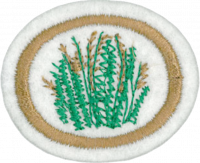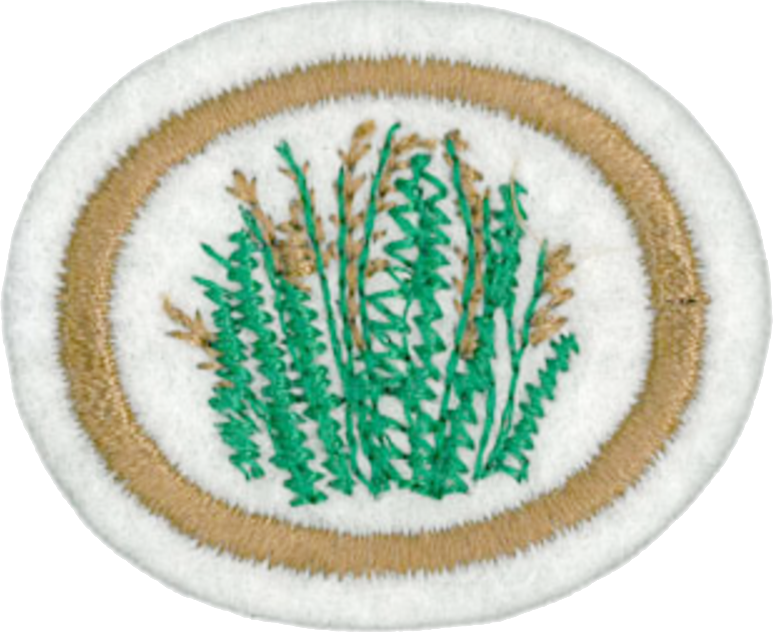Difference between revisions of "AY Honors/Grasses/Requirements"
Jomegat bot (talk | contribs) m (Jomegat bot moved page AY Honor Grasses Requirements to AY Honor Grasses Requirements: Bot: Moved page) |
m (- Category of Honor Requirements) |
||
| (6 intermediate revisions by 2 users not shown) | |||
| Line 1: | Line 1: | ||
| − | + | {{HonorSubpage}} | |
| − | |||
| − | |||
| − | + | <section begin=Body /> | |
| − | |||
| − | <b> | + | <b>1. <section begin=req1 /><noinclude><translate><!--T:1--> |
| − | <section end= | + | </noinclude>What characteristics must a plant have to qualify as a grass? |
| + | <noinclude></translate></noinclude><section end=req1 /></b> | ||
| − | <b> | + | <b>2. <section begin=req2 /><noinclude><translate><!--T:2--> |
| − | <section end= | + | </noinclude>What kind of roots do all grasses have? |
| + | <noinclude></translate></noinclude><section end=req2 /></b> | ||
| − | <b> | + | <b>3. <section begin=req3 /><noinclude><translate><!--T:3--> |
| − | <section end= | + | </noinclude>About how many species around the world are there in the grass family called Gramineae or Poaceae? |
| + | <noinclude></translate></noinclude><section end=req3 /></b> | ||
| − | <b> | + | <b>4. <section begin=req4 /><noinclude><translate><!--T:4--> |
| − | <section end= | + | </noinclude>Do the seeds of grasses have two halves as does the bean (a dicotyledon), or does the seed consist of just one part as do the lily, date, and coconut (monocotyledons)? |
| + | <noinclude></translate></noinclude><section end=req4 /></b> | ||
| − | <b> | + | <b>5. <section begin=req5 /><noinclude><translate><!--T:5--> |
| − | <section end= | + | </noinclude>What unique characteristic in the growth of grass leaves makes it possible for the plant to flourish even though continually mowed or grazed? |
| + | <noinclude></translate></noinclude><section end=req5 /></b> | ||
| − | <b> | + | <b>6. <section begin=req6 /><noinclude><translate><!--T:6--> |
| − | <section end= | + | </noinclude>Name three annual grasses, that is, grasses that sprout from seeds, blossom, bear seeds, and then die the same summer. |
| + | <noinclude></translate></noinclude><section end=req6 /></b> | ||
| − | <b> | + | <b>7. <section begin=req7 /><noinclude><translate><!--T:7--> |
| − | <section end= | + | </noinclude>Name three perennial grasses, that is, grasses whose roots live on from year to year, although the top dies down to the crown each autumn. |
| + | <noinclude></translate></noinclude><section end=req7 /></b> | ||
| − | + | <b>8. <section begin=req8 /><noinclude><translate><!--T:8--> | |
| − | < | + | </noinclude>In each of the following cases name a single grass, or more where indicated, from which the product is made: |
| + | <noinclude></translate></noinclude><section end=req8 /></b> | ||
| − | :<b> | + | :<b>a. <section begin=req8a /><noinclude><translate><!--T:9--> |
| − | < | + | </noinclude>Bread (three grasses) |
| + | <noinclude></translate></noinclude><section end=req8a /></b> | ||
| − | :<b> | + | :<b>b. <section begin=req8b /><noinclude><translate><!--T:10--> |
| − | < | + | </noinclude>Brooms |
| + | <noinclude></translate></noinclude><section end=req8b /></b> | ||
| − | :<b> | + | :<b>c. <section begin=req8c /><noinclude><translate><!--T:11--> |
| − | < | + | </noinclude>Fishing poles |
| + | <noinclude></translate></noinclude><section end=req8c /></b> | ||
| − | :<b> | + | :<b>d. <section begin=req8d /><noinclude><translate><!--T:12--> |
| − | < | + | </noinclude>Gluten |
| + | <noinclude></translate></noinclude><section end=req8d /></b> | ||
| − | :<b> | + | :<b>e. <section begin=req8e /><noinclude><translate><!--T:13--> |
| − | < | + | </noinclude>Grain alcohol (two grasses) |
| + | <noinclude></translate></noinclude><section end=req8e /></b> | ||
| − | :<b> | + | :<b>f. <section begin=req8f /><noinclude><translate><!--T:14--> |
| − | < | + | </noinclude>Hay |
| + | <noinclude></translate></noinclude><section end=req8f /></b> | ||
| − | :<b> | + | :<b>g. <section begin=req8g /><noinclude><translate><!--T:15--> |
| − | < | + | </noinclude>Hominy |
| + | <noinclude></translate></noinclude><section end=req8g /></b> | ||
| − | :<b> | + | :<b>h. <section begin=req8h /><noinclude><translate><!--T:16--> |
| − | < | + | </noinclude>Molasses |
| + | <noinclude></translate></noinclude><section end=req8h /></b> | ||
| − | :<b> | + | :<b>i. <section begin=req8i /><noinclude><translate><!--T:17--> |
| − | < | + | </noinclude>Oatmeal |
| + | <noinclude></translate></noinclude><section end=req8i /></b> | ||
| − | :<b> | + | :<b>j. <section begin=req8j /><noinclude><translate><!--T:18--> |
| − | < | + | </noinclude>Starch |
| + | <noinclude></translate></noinclude><section end=req8j /></b> | ||
| − | :<b> | + | :<b>k. <section begin=req8k /><noinclude><translate><!--T:19--> |
| − | < | + | </noinclude>Sugar |
| + | <noinclude></translate></noinclude><section end=req8k /></b> | ||
| − | <b> | + | :<b>l. <section begin=req8l /><noinclude><translate><!--T:20--> |
| − | < | + | </noinclude>White flour |
| + | <noinclude></translate></noinclude><section end=req8l /></b> | ||
| − | + | <b>9. <section begin=req9 /><noinclude><translate><!--T:21--> | |
| − | < | + | </noinclude>Do one of the following: |
| + | <noinclude></translate></noinclude><section end=req9 /></b> | ||
| − | :<b> | + | :<b>a. <section begin=req9a /><noinclude><translate><!--T:22--> |
| − | <section end= | + | </noinclude>Collect and correctly label ten cultivated grasses. |
| + | <noinclude></translate></noinclude><section end=req9a /></b> | ||
| − | <b> | + | :<b>b. <section begin=req9b /><noinclude><translate><!--T:23--> |
| − | <section end= | + | </noinclude>Write an essay on the various uses of grasses by different people around the world. |
| + | <noinclude></translate></noinclude><section end=req9b /></b> | ||
| − | <b> | + | <b>10. <section begin=req10 /><noinclude><translate><!--T:24--> |
| − | <section end= | + | </noinclude>Press or dry, mount, and correctly label the flower stalks or seed stalks of five pestiferous grasses that are commonly considered to be weeds. |
| + | <noinclude></translate></noinclude><section end=req10 /></b> | ||
| − | + | <section begin=challenge /> | |
| − | + | <b>11. <section begin=req11 /><noinclude><translate><!--T:25--> | |
| + | </noinclude>In addition to your collection of flower or seed stalks of pestiferous kinds, press, mount, and correctly name the flower stalks or seed stalks of ten additional grasses that grow in your neighborhood. This collection may include some of the plants whose seeds are in your collection of cultivated grasses. | ||
| + | <noinclude></translate></noinclude><section end=req11 /></b> | ||
| + | <section end=challenge /> | ||
| + | <section end=Body /> | ||
Latest revision as of 17:19, 21 July 2022
1. What characteristics must a plant have to qualify as a grass?
2. What kind of roots do all grasses have?
3. About how many species around the world are there in the grass family called Gramineae or Poaceae?
4. Do the seeds of grasses have two halves as does the bean (a dicotyledon), or does the seed consist of just one part as do the lily, date, and coconut (monocotyledons)?
5. What unique characteristic in the growth of grass leaves makes it possible for the plant to flourish even though continually mowed or grazed?
6. Name three annual grasses, that is, grasses that sprout from seeds, blossom, bear seeds, and then die the same summer.
7. Name three perennial grasses, that is, grasses whose roots live on from year to year, although the top dies down to the crown each autumn.
8. In each of the following cases name a single grass, or more where indicated, from which the product is made:
- a. Bread (three grasses)
- b. Brooms
- c. Fishing poles
- d. Gluten
- e. Grain alcohol (two grasses)
- f. Hay
- g. Hominy
- h. Molasses
- i. Oatmeal
- j. Starch
- k. Sugar
- l. White flour
9. Do one of the following:
- a. Collect and correctly label ten cultivated grasses.
- b. Write an essay on the various uses of grasses by different people around the world.
10. Press or dry, mount, and correctly label the flower stalks or seed stalks of five pestiferous grasses that are commonly considered to be weeds.
11. In addition to your collection of flower or seed stalks of pestiferous kinds, press, mount, and correctly name the flower stalks or seed stalks of ten additional grasses that grow in your neighborhood. This collection may include some of the plants whose seeds are in your collection of cultivated grasses.


